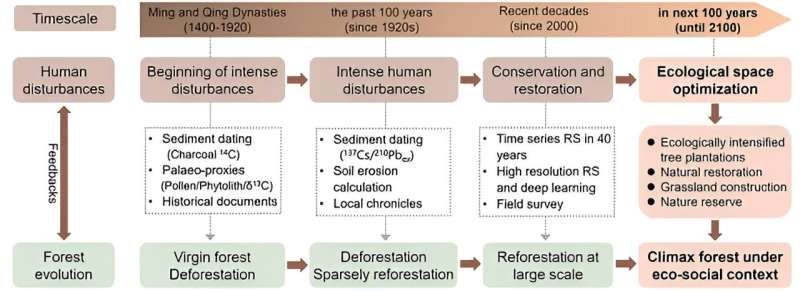This article has been reviewed according to Science X's editorial process and policies. Editors have highlighted the following attributes while ensuring the content's credibility:
fact-checked
peer-reviewed publication
trusted source
proofread
Researchers propose new socio-ecological framework for sustainable reforestation in Karst regions

The South China Karst, the world's most concentrated karst area, has reduced rocky desertification through extensive conservation and restoration over the past two decades, making it a global "greening" hotspot. However, the sustainability of this trend remains uncertain due to challenges related to afforestation site selection, forest productivity, ecosystem services, and balancing "greening" with economic benefits.
Researchers led by Prof. Wang Kelin from the Institute of Subtropical Agriculture of the Chinese Academy of Sciences have proposed a socio-ecological framework to enhance the sustainability of ecological restoration in karst regions under geological constraints.
Their latest study, published in Earth's Future on May 14, is the first to review both the natural and social dimensions of controlling rocky desertification, and proposes a socio-ecological framework that focuses on forest degradation, carbonate rock constraints, and human impacts.
This framework optimizes future ecological spaces by considering the socio-ecological context and establishing long-term human-ecosystem interactions. It incorporates historical changes and identifies key periods of human disturbance and forest evolution in the karst region of Southwest China.
Using sediment analysis, historical records, remote sensing, and deep learning, the researchers reconstructed forest evolution since the Ming-Qing dynasties, providing a scientific basis for optimizing ecological restoration in karst regions.
"This framework can be applied to ecological restoration in vulnerable areas with different socio-ecological contexts," said Prof. Yue Yuemin, corresponding author of the study. "By analyzing forest dynamics and deforestation processes, it deepens our understanding of how forests respond to human activities and climate change, and informs decisions about the need for restoration efforts."
More information: Yuemin Yue et al, A Social‐Ecological Framework to Enhance Sustainable Reforestation Under Geological Constraints, Earth's Future (2024). DOI: 10.1029/2023EF004335
Journal information: Earth's Future
Provided by Chinese Academy of Sciences



















